Soldier Boy theatre reviews
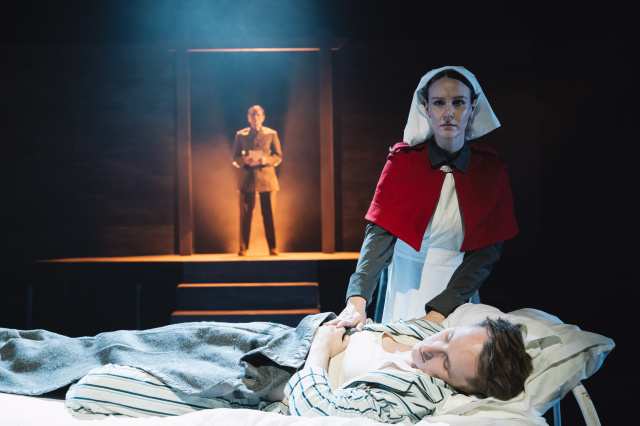
Jim's deathbed. From left Ashlynn Parigi, Emily Joy, Oliver Tapp
All photos Steven Mitchell Wright
AUSTRALIAN ARTS REVIEW
"... a living, breathing elegy to lost youth, to courage in its most fragile form, and to the aching cost of sacrifice."
In a deeply moving staged production of Soldier Boy, adapted from Anthony Hill’s celebrated novel, director Beng Oh delivers a poignant and profoundly human story about our youngest ANZAC to have died on active service.
First published in 2001, Hill’s novel blends biography and historical narrative to tell the true story of 14-year-old Private James Martin, a boy from Victoria, driven by patriotism and a desire for adventure, who lied about his age to enlist in the Australian Imperial Force.
Beng Oh’s direction is thoughtful and restrained, allowing the raw power of the story to shine through without sentimentality. Scenes shift with fluidity, supported by spare yet evocative staging that conjures both the suburban streets of 1915 Australia and the muddy terror of Gallipoli. Oh wisely leans into the quiet moments, reminding us that war is not just history, but heartbreak lived moment by moment by those affected individuals.
At the heart of the show is Oliver Tapp’s astonishing portrayal [of] James Martin. Tapp’s performance is grounded in innocence and lit with youthful idealism. Tapp captures the boyish enthusiasm of a teenager swept up in dreams of glory, then gradually leads us through the growing shadow of war with such heartbreaking subtlety.
As Frank’s [Jim’s] mother, Marian [Amelia], Laura Iris Hill’s performance is grounded in the quiet strength of a woman trying to hold her family together as war unravels it thread by thread. She conveys the unbearable ache of a mother watching her child step into history – and out of reach.
They are equally supported by a stellar cast including Philip Hayden, Emily Joy, Marc Opitz, Ashlynn Parigi, Charlie Veitch and Mark Yeates, who enrich Frank’s [Jim’s] world with authenticity, whether they be family members or soldiers on the battlefield or the troop ship.
The design team have crafted a world that feels heartbreakingly real yet poetically heightened. Effectively lit by Sidney Younger, Viv Hargreaves' minimalist multi-level set offers a multi-functional space that transitions effortlessly from home to battlefield.
Jack Burmeister’s sound design underscores the emotional landscape with subtlety and power, while Adrienne Chisholm’s costumes add a level of authenticity to the narrative. Every design choice in this production is purposeful, elevating the storytelling at every turn.
This Soldier Boy is no dry history lesson. It’s a living, breathing elegy to lost youth, to courage in its most fragile form, and to the aching cost of sacrifice. In an age where the meaning of heroism is often blurred, this production restores its gravity with clarity and grace.
Review: Rohan Shearn
24 June 2025
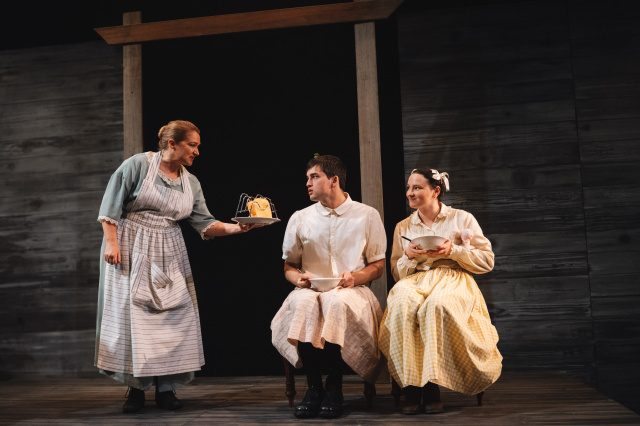
Breakfast at home. From left Laura Iris Hill, Charlie Veitch, Ashlynn Parigi
* * *
ARTSHUB
Theatre review: Soldier Boy, Theatre Works
From Melbourne to Gallipoli, Anthony Hill's play follows a boy's journey to war.
Jim Martin (Oliver Tapp) lies dying on a hospital ship off the coast of Gallipoli. His body is battling typhoid and in a fevered state he has visions of the moments that led to this final battle. Soldier Boy tells the tragic story of Australia’s youngest ANZAC in a moving production at Theatre Works.
Anthony Hill has adapted their own book about the life of Martin. The script convincingly portrays the mindset of a 14-year-old and how the culture of the time led to dreams of adventure overseas. The struggle to convince his parents to consent to his joining the expeditionary force is handled believably. The play is full of touching moments and the black humour effectively conveys the futility of the Gallipoli campaign.
However, it does feel like there has been a missed opportunity to make more of Jim’s fevered state – to create a more fantastical narrative.
Soldier Boy is a poignant reminder of the complicated legacy of the ANZAC legend. While reminding us of the sacrifice of those who have served the country, it also does not let us forget the mistakes that led to the loss of many young lives. The prevailing culture of the time and the glorification of war that was able to convince children that this was a grand adventure is an important lesson.
A display of photographs and letters written by Martin in the foyer serve as reminders that the show is based on real life events.
Oliver Tapp is excellent in the lead role, successfully portraying a young boy that can pass as an adult in an endearing and memorable performance. The rest of the cast play multiple parts and provide solid support. The gender swapping of characters, and having adults play kids is an interesting approach that fits alongside the central deception regarding Martin’s age.
There are some touching glimpses of his childhood and more could have been made of the relationships back home. While Martin’s relationship with his parents has substance, those with his siblings are superficial and could have been explored in more depth.
The set designed by Viv Hargreaves comprises a wooden stage with steps leading up to a scaffold with tied up ropes. The grim reminder of death is a constant throughout the show. Most of the action occurs on this stage or on the spacious floorspace in front upon which tables, chairs and Martin’s hospital bed are moved in and out to change the scene.
Adrienne Chisholm’s costumes are a perfect fit for the time. The sound design by Jack Burmeister and lighting design by Sidney Younger work brilliantly together to create atmosphere, from light and dark psychological moods to the sounds of war.
There is good use of songs to set period and place, and Beng Oh’s direction nicely balances the feel of home with the foreignness of Egypt and Turkey. It is always clear where and what is happening.
At a time when there are multiple major conflicts around the world, Soldier Boy is a compelling and heart-wrenching production and a timely reminder of the many victims of war.
Soldier Boy by Anthony Hill
Theatre Works
Director: Beng Oh
Sound Designer and Composer: Jack Burmeister
Lighting Designer: Sidney Younger
Set Designer: Viv Hargreaves
Costume Coordinator: Adrienne Chisholm
Stage Manager: Ella Thompson
Assistant Stage Manager: Kade Lightfoot
Associate Secondment (Directing): Jessica Fallico
Associate Secondment (Marketing and Producing): Arianna Marchiori
Cast: Philip Hayden, Laura Iris Hill, Emily Joy, Marc Opitz, Ashlynn Parigi, Oliver Tapp, Charlie Veitch, Mark Yeates
Tickets: $25-$55
Soldier Boy will be performed at Theatre Works in Acland Street, St Kilda Victoria until 5 July 2025.
Review: Kim Hitchcock
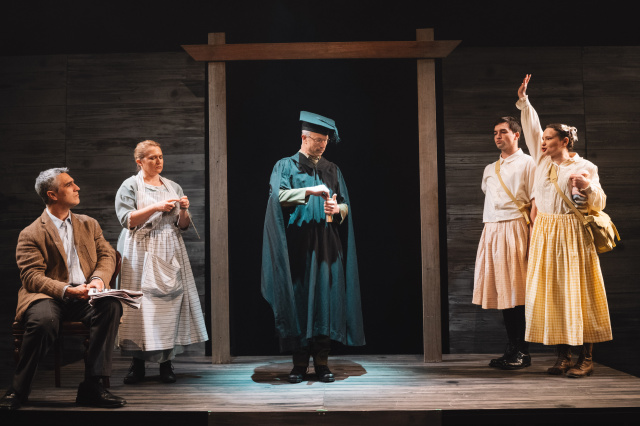
Every boy must do his duty. From left, Philip Hayden, Laura Iris Hill, Marc Opitz, Charlie Veitch, Ashynn Parigi
* * *
STAGE WHISPERS
By Anthony Hill, adapted from his novel. Theatre Works, St Kilda. 19 June – 5 July 2025
Soldier Boy tells the story of James (‘Jim’) Martin (Oliver Tapp), who enlists at age 14, and serves at Gallipoli, the youngest Australian to die there in 1915. Australian audiences will have varying responses to the play. Some – younger folks - will learn about the costly, futile Gallipoli campaign (and the play sometimes seems designed for them) for the first time. Others will acknowledge the facts of what is depicted – the idealism that corrodes, the constant jeopardy, the casualties at now legendary places like Lone Pine and The Nek, the black humour, the heat and the cold, the lack of water, food and proper sanitation, the flies, and diseases... But others again may expect more than this because they know all this already – especially students of history or those who read Albert Facey’s immensely popular autobiography A Fortunate Life.
Playwright Anthony Hill and director/dramaturg Beng Oh circumvent the familiar by focussing on young Jim’s trajectory from schoolboy to soldier, from a something-to-prove child to a disillusioned teenager, by employing a circular structure. They bookend the story with Jim aboard a hospital ship, sick with typhoid, and burning up with fever. So, Jim’s story is made up of Jim’s memories, his fever dreams. In a program note director Beng Oh says, ‘...we have eschewed documentary theatre and naturalism in favour of a heightened staging that distorts and refracts but is nevertheless emotionally truthful.’
Whether or not this mode is always successful – or even at times discernible – Beng Oh gives us striking images of soldiers at war – not just in bewildering battle, but in the endless waiting and enduring that is warfare. Much of the play’s emotion comes in the letters Jim, seated isolated in a pool of light, writes home – frustratingly never getting any reply.
But pre-war, there’s a surreal scene back in Melbourne in which Jim blackmails his parents (Laura Iris Hill and Philip Hayden) into giving permission for him to enlist (and lie about his age): it’s repeated consecutively word for word four times. Of course, Jim remembers that - the fatal turning point in the story. Later, when Jim’s troop transport is torpedoed, the struggles of the drowning men under and above water is masterfully staged by Oh – and beautifully lit by Sidney Younger.
Younger’s lighting in fact makes a huge contribution to the storytelling – from Jim’s sunny schooldays, full of patriotic nonsense, to a Gallipoli campfire scene where worn out troops greet Jim and newcomers, and then to a surprise Turkish attack where Jim and his comrades shoot wildly into black darkness, and so to the gloom and horror that settles on Jim’s Mum and Dad back home...
The device of the ‘fever dream’, notwithstanding, however, it’s in the nature of things that once Jim is there at Gallipoli, he can only be another soldier, and the play does settle a little into ‘this happened and then that happened and this this...’ That is, objective scenes that tell us what it was really like. Unlike Anthony Hill’s novel, we can only experience things with Jim as an observer; we can only rarely share his thoughts. As a dramatic character, he scarcely interacts with his comrades. The result is that the story – that’s also a partial debunking of one of our national myths - can feel just a little flat despite the best efforts of all concerned.
One senses various constraints on Beng Oh with this project. For a ‘war story’ that isn’t the usual war story, there seem to’ve been tight budget restraints. Viv Hargreaves’ simple timber set must stand in for many locations – but its great virtue is that it provides a series of resonant frames for a number of scenes – silhouetting grieving soldiers through to adding finality to Mum’s grief back home. Besides Younger’s lighting, Jack Burmeister’s excellent sound design – heightened natural sounds as well as cheerful, faintly heard songs of the period – lifts the austerity of the set into imaginative territory. As to the small cast of eight, there’s a necessity for doubling. So, Ashlynn Parigi and Charlie Veitch play Jim’s younger siblings and soldiers in Jim’s platoon – the latter very successfully. Emily Joy is a kindly Matron but has great fun as a goofy soldier. Mark Yeates and Mark Opitz play a variety of authority figures that Jim encounters on his way to war and when he gets there – with Opitz finally wrapping up the story as Narrator.
Review: Michael Brindley
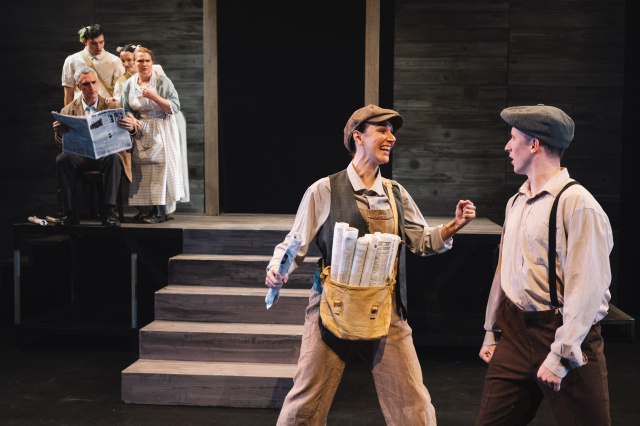
War news. From left, Philip, Charlie, Ashlynn, Laura, Emily, Oliver.
* * *
THE BLURB
It is October 1915. Private James Martin (Oliver Tapp) is lying in bed on the hospital ship the Glenart Castle coughing his lungs out. Memories of his family back home in Australia come flooding back. This is the story of a boy who, after blackmailing his parents, enlisted in the Army, having falsified his age. While that was not uncommon at the time, 14 – which Martin was – was particularly young. The official youngest age for military service was 18.
At school, Jimmy had been a keen cadet. Once he joined the armed forces and undertook military training, he was shipped off to Egypt, before making his way to Gallipoli to fight the Turks. Until that point, he had never fired a shot in anger. Conditions were harsh and unrelenting. Good drinking water was in short supply. Sanitation was questionable, to say the least. Intense heat brought flies in plague proportions, before bitter cold took over. As the casualty toll mounted, so too those who fell severely ill with typhoid – among them Private James Martin.
With a cast of eight, Soldier Boy is a look back on the life and times of Martin and his extended family. This was a lad who was keen on all things military from a young age. His father had tried to enlist, but was rejected. We learn about the environment in which Jimmy was brought up and what happened to him after he joined the Army. That includes his fate and that of others close to him.
Anthony Hill’s has dramatised his 2001 book of the same name in this play. He has done so alongside dramaturg Beng Oh, who also directs the piece. Complete with evocative sound, lighting and costuming from Jack Burmeister, Sidney Younger and Adrienne Chisholm respectively, we take a step back in time. Excitement at seeing troops sent off to war turns to the harsh reality of boots on the ground. Lest you think it is all dour, it is not. There are lashings of humour, although I felt they tended to the clichéd.
As the centrepiece of the production, Tapp readily channels the highs and lows of a youngster who had no idea what he was in for, as anticipation gives way to reality. He literally soldiers on until he can no more. I also thought that Laura Iris Hill was particularly strong as Martin’s loving, but no-nonsense mother. That was not only about how she carried herself, but the look in her eyes. Others fill multiple roles.
In the cavernous space that is Theatre Works, on occasions the soundscape made it difficult to clearly hear every spoken word. It didn’t help that the staging (notwithstanding the potent timber set design by Viv Hargreaves) was on two levels. Mind you, the use of props worked well. What certainly wasn’t lost on me was the magnitude and gravitas of what went down.
While deliberately focusing on Private Martin, Anthony Hill has crafted a powerful, emotion-charged story. I was left in no two minds about just how the Gallipoli campaign impacted the lives of so many that were sent there, along with their families. Soldier Boy is on at Theatre Works until 5th July, 2025.
Review: Alex First
Alex First is the editor of The Blurb. Alex is a Melbourne based journalist and communications specialist. He also contributes to The Blurb on film and theatre.

Happy birthday 14-year-old. From left, Philip Hayden, Laura Iris Hill
* * *
THEATRE MATTERS
Soldier Boy
by Kris Weber | Jun 27, 2025
Anthony Hill’s Soldier Boy, adapted from his 2001 novel, brings to the stage the poignant true story of James “Jim” Martin, the youngest Australian soldier to die in active service during World War I. At just 14 years old, Martin lied about his age to enlist in the Australian Imperial Force, swept up in the fervour of imperial nationalism and dreams of adventure. The play, set during his final hours aboard a hospital ship off Gallipoli, unfolds as a fevered recollection of his journey from suburban Melbourne to the horrors of war.
The narrative follows Jim’s emotional and physical transformation, from a boy eager to serve his country to a young soldier grappling with the grim realities of the trenches. Through flashbacks and hallucinations, the play explores patriotism, sacrifice, and the manipulation of youth by nationalistic ideals. Soldier Boy resonates as a cautionary tale about the cost of blind allegiance and the fragility of youthful idealism.
Oliver Tapp delivers a compelling performance as Jim Martin, capturing the innocence and bravado of a boy caught in the machinery of war. His portrayal anchors the production with heart. Laura Iris Hill, as Jim’s mother Amelia, brings quiet strength to her role, embodying the anguish of a parent watching her child slip away into history. Mark Yeates stands out in multiple roles, offering distinct and believable characterisations that enrich the authoritative world around Jim.
Portraying numerous roles is always a challenge and the many characterisations the cast portray have varying degrees of success, with some characters, mainly military ones, lacking depth. But there were some lovely cameos throughout the production; Emily Joy as the hospital ship Matron is believably warm and motherly; Charlie Veitch as Jim’s soldier mate captures both the camaraderie and tragedy of war; Philip Hayden as Jim’s father offers a gentle characterisation; Ashlynn Parigi as Jim’s younger sister is suitably childlike and Marc Optiz convincingly authoritative.
Beng Oh’s direction brings moments of striking emotional resonance, particularly in the well-composed scenes between Jim and his parents, which are sensitively staged. These intimate moments reveal a deep understanding of character. The military scenes felt less cohesive and occasionally lacked clarity — but the ambition behind the direction is evident.
Technically, this production shines. Adrienne Chisholm’s costumes are a standout, meticulously detailed and evocative of the era. Jack Burmeister’s sound design is atmospheric and immersive, enhancing the emotional landscape with subtle power. Sidney Younger’s lighting design effectively segments time and place, guiding the audience through Jim’s fragmented memories with precision.
Overall, Soldier Boy is a heartfelt tribute to a little-known figure in Australian history. It succeeds in shedding light on the tragic consequences of war and the vulnerability of youth. Soldier Boy offers a moving and interesting theatrical experience.
Review: David Gardette
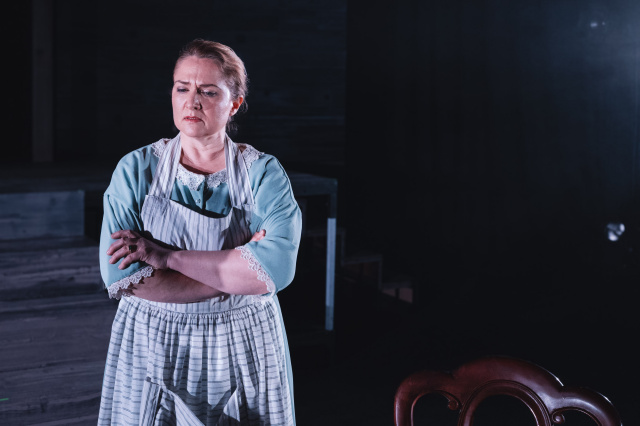
It's blackmail! Laura Iris Hill as Jim's mother, Amelia.
* * *
ON STAGE: SOLDIER BOY
The tragic story of the youngest Australian to have died in World War 1 is emotionally brought to life in Soldier Boy playing at Melbourne’s Theatre Works.
Based on a novel by Anthony Hill, Soldier Boy tells of the death of James Charles Martin (known as Jim) at the age of 14 years nine months after he contracted typhoid while fighting in Gallipoli.
The play first tells of his upbringing in a small country town. Born into a seemingly caring and close-knit family, he loved the outdoors and his school cadets.
Like many young men of the time when the first world war broke out he was drawn to the idea of fighting for king and country overseas and was determined to join up.
His parents initially refused Jim’s request to help him however as a result of his continual threats to run away and enlist pretending to be 18, they eventually relented. This meant writing a supportive letter as parental consent was needed for anyone aged between 18 and 21 to enlist.
Amazingly, given his age at the time, no one in army recruitment questioned his age despite the consent letter.
Soldier Boy then explores his army training in Victoria, the sinking of the ship he was travelling on to the Dardanelles and then life in the trenches in Gallipoli.
Stories of that life, as described by a couple of diggers about to go on leave, are particularly harrowing and one of many emotional scenes in Soldier Boy. Jim’s final days, as he succumbs to a shocking death as a result of typhoid, are equally painful to watch.
Much of the credit for this goes to Oliver Tapp who expertly shows Jim’s transformation from a typical enthusiastic carefree youngster to a scared, war weary and then sick 14-year-old.
The disappointment and hurt he experiences during his time in the trenches when everyone but him receives mail from home for no apparent reason ( because the family wrote often) is palpable.
His final minutes leading up to his death when he calls out for his mother are tear worthy.
Laura Iris Hill as Jim’s mother also gives a fine performance clearly demonstrating the anguish she faced in deciding to sign the consent letter. Her character also shows a more rational approach compared to those around her who were caught up in the hype surrounding the war.
Both leads were well supported by a supporting cast including Philip Hayden, Emily Joy, Marc Opitz, Ashlynn Parigi, Charlie Veitch and Mark Yeates, who all played numerous characters throughout the 85-minute play.
Due to its very nature Soldier Boy is at times difficult to watch but for that reason effectively highlights the innocence of youth against the brutal realities of war.
Review:Jenny Burns
Soldier Boy is playing at Theatre Works,14 Acland Street, St Kilda, until Saturday July 5. For more information and tickets visit the Theatre Works website.
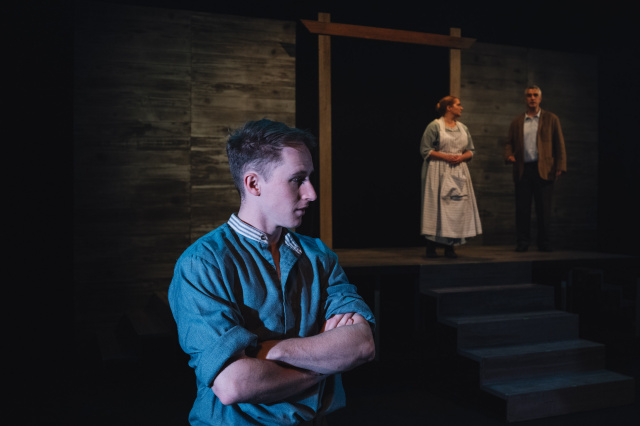
A soldier's farewell. Oliver Tapp, Laura Iris Hill, Philip Hayden as Jim's father, Charlie
* * *